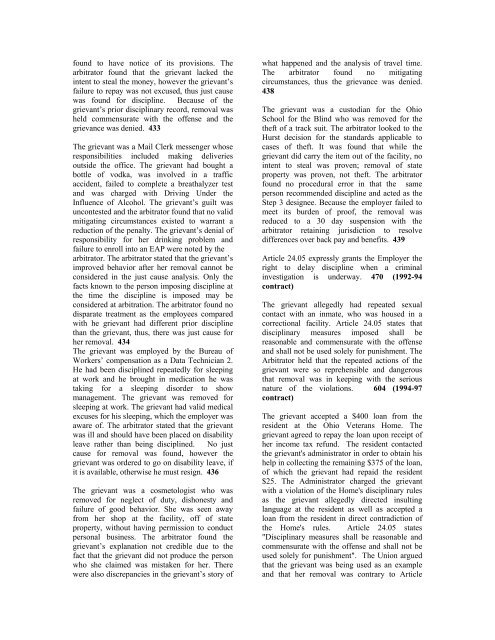by Contract Number (PDF) - OCSEA
by Contract Number (PDF) - OCSEA
by Contract Number (PDF) - OCSEA
Create successful ePaper yourself
Turn your PDF publications into a flip-book with our unique Google optimized e-Paper software.
found to have notice of its provisions. The<br />
arbitrator found that the grievant lacked the<br />
intent to steal the money, however the grievant’s<br />
failure to repay was not excused, thus just cause<br />
was found for discipline. Because of the<br />
grievant’s prior disciplinary record, removal was<br />
held commensurate with the offense and the<br />
grievance was denied. 433<br />
The grievant was a Mail Clerk messenger whose<br />
responsibilities included making deliveries<br />
outside the office. The grievant had bought a<br />
bottle of vodka, was involved in a traffic<br />
accident, failed to complete a breathalyzer test<br />
and was charged with Driving Under the<br />
Influence of Alcohol. The grievant’s guilt was<br />
uncontested and the arbitrator found that no valid<br />
mitigating circumstances existed to warrant a<br />
reduction of the penalty. The grievant’s denial of<br />
responsibility for her drinking problem and<br />
failure to enroll into an EAP were noted <strong>by</strong> the<br />
arbitrator. The arbitrator stated that the grievant’s<br />
improved behavior after her removal cannot be<br />
considered in the just cause analysis. Only the<br />
facts known to the person imposing discipline at<br />
the time the discipline is imposed may be<br />
considered at arbitration. The arbitrator found no<br />
disparate treatment as the employees compared<br />
with he grievant had different prior discipline<br />
than the grievant, thus, there was just cause for<br />
her removal. 434<br />
The grievant was employed <strong>by</strong> the Bureau of<br />
Workers’ compensation as a Data Technician 2.<br />
He had been disciplined repeatedly for sleeping<br />
at work and he brought in medication he was<br />
taking for a sleeping disorder to show<br />
management. The grievant was removed for<br />
sleeping at work. The grievant had valid medical<br />
excuses for his sleeping, which the employer was<br />
aware of. The arbitrator stated that the grievant<br />
was ill and should have been placed on disability<br />
leave rather than being disciplined. No just<br />
cause for removal was found, however the<br />
grievant was ordered to go on disability leave, if<br />
it is available, otherwise he must resign. 436<br />
The grievant was a cosmetologist who was<br />
removed for neglect of duty, dishonesty and<br />
failure of good behavior. She was seen away<br />
from her shop at the facility, off of state<br />
property, without having permission to conduct<br />
personal business. The arbitrator found the<br />
grievant’s explanation not credible due to the<br />
fact that the grievant did not produce the person<br />
who she claimed was mistaken for her. There<br />
were also discrepancies in the grievant’s story of<br />
what happened and the analysis of travel time.<br />
The arbitrator found no mitigating<br />
circumstances, thus the grievance was denied.<br />
438<br />
The grievant was a custodian for the Ohio<br />
School for the Blind who was removed for the<br />
theft of a track suit. The arbitrator looked to the<br />
Hurst decision for the standards applicable to<br />
cases of theft. It was found that while the<br />
grievant did carry the item out of the facility, no<br />
intent to steal was proven; removal of state<br />
property was proven, not theft. The arbitrator<br />
found no procedural error in that the same<br />
person recommended discipline and acted as the<br />
Step 3 designee. Because the employer failed to<br />
meet its burden of proof, the removal was<br />
reduced to a 30 day suspension with the<br />
arbitrator retaining jurisdiction to resolve<br />
differences over back pay and benefits. 439<br />
Article 24.05 expressly grants the Employer the<br />
right to delay discipline when a criminal<br />
investigation is underway. 470 (1992-94<br />
contract)<br />
The grievant allegedly had repeated sexual<br />
contact with an inmate, who was housed in a<br />
correctional facility. Article 24.05 states that<br />
disciplinary measures imposed shall be<br />
reasonable and commensurate with the offense<br />
and shall not be used solely for punishment. The<br />
Arbitrator held that the repeated actions of the<br />
grievant were so reprehensible and dangerous<br />
that removal was in keeping with the serious<br />
nature of the violations. 604 (1994-97<br />
contract)<br />
The grievant accepted a $400 loan from the<br />
resident at the Ohio Veterans Home. The<br />
grievant agreed to repay the loan upon receipt of<br />
her income tax refund. The resident contacted<br />
the grievant's administrator in order to obtain his<br />
help in collecting the remaining $375 of the loan,<br />
of which the grievant had repaid the resident<br />
$25. The Administrator charged the grievant<br />
with a violation of the Home's disciplinary rules<br />
as the grievant allegedly directed insulting<br />
language at the resident as well as accepted a<br />
loan from the resident in direct contradiction of<br />
the Home's rules. Article 24.05 states<br />
"Disciplinary measures shall be reasonable and<br />
commensurate with the offense and shall not be<br />
used solely for punishment". The Union argued<br />
that the grievant was being used as an example<br />
and that her removal was contrary to Article
















